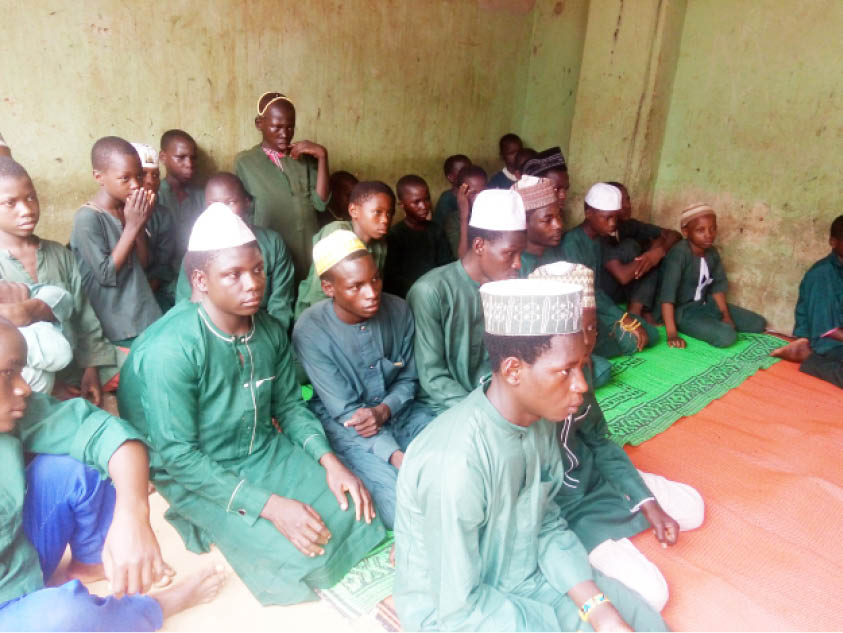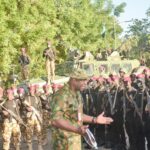It appears like any other almajiri school where boys (almajiri) gather before a malam (teacher) to study the Qur’an and other Islamic books, but Madarasatul Hadimatul Islamiyya Wal-tarbiyya, otherwise known as Makarantar Malam Umar Alhadim, has peculiar features that distinguishes it with from other almajiri schools.
At Makarantar Malam Umar Alhadim which is located at Mabera area in Sokoto South Local Government Area of Sokoto State, pupils (almajiri) are barred from street begging despite coming from far distances like Niger, Zamfara and Kebbi states.
New Islamic year: Sokoto declares Friday public holiday
Police rescue man locked up for 15 years in Sokoto
It was gathered that parents must agree to provide what will sustain their children monthly before they are enrolled into the school. This is aside the initial payment of N4,000, after which there will be no other form of payment no matter how long the children stay in the school.
The Proprietor of the school, Malam Umar Alhadim, explained that N1,000 out of each fee was meant for registration, N2,000 for uniform and N1,000 was deposited with a nearby pharmaceutical store in case of any ailment that required urgent medical attention.
Malam Alhadim said the school had a total of 2,200 pupils, out of which over 400 were boarding students, and added that there were female students who only came during lesson hours and went back home after closing, explaining that, “There is no female among the boarding students because it is against our tradition and religion.”
The proprietor who spoke with reporters shortly after receiving the chairman and members of an NGO, Shehu Maikoli Foundation, who were on an on-the-spot assessment of the school as part of their activities lined up to commemorate the 2020 World Humanitarian Day, added that the school was on its own as it had never received any support from government or individuals.
He said they were maintaining the school from the N20 weekly contribution by their students, especially those that were into different trades like cap knitting and repairing of prayer bids.
He further said the day students were charged N200, but that only half of them paid due to the current economic hardship in the country.
He explained that, “So what we realise at the end of the month is very insignificant; that I and my younger brother, who is assisting me in running the school, have to complement to be able to maintain our facilities.”
Malam Alhadim said the school, despite being a centre for Islamic knowledge, operated coaching classes for secular education, where the most senior pupils were provided with basic western knowledge, which had been enabling them transit to secondary school without hiccup.
He explained that, “We have our pupils in different secondary schools across the state. In fact, some of them are sitting for the ongoing Senior Secondary Certificate Examination (SSCE). Last two years, one of our pupils scored eight credits in WAEC and is now studying Arabic Studies at the Shehu Shagari College of Education, Sokoto.
“We also have a student that is studying Education Mathematics at the Usmanu Danfodiyo University (UDU), Sokoto. These students never had any primary school background. It was the few hours coaching they received from us that made them secure admission into secondary schools.
“That is why I keep reminding people who are fond of mocking the almajiri, disparaging and attributing all sorts of nonsense to them, that these pupils are naturally gifted and can become something.”
He further said, “It is not easy to memorise the entire Qur’an, except you are naturally endowed. And when one of my pupils scored eight credits two years ago, some of these people began to have a second thought about the almajiri system.”
Alhadim added that the school had taken the burden of paying registration fees for its students admitted into tertiary institutions because some of their parents would not want them attending such schools due to some reasons, but that there “are some who are very supportive and contribute in paying their children’s school fees.”

He, therefore, appealed for financial support from government, corporate organisations and individuals, saying the 11 teachers in the school were their former students who were volunteering because the school could not afford recruiting external teachers.
He also urged the state government to consider his students in its skills acquisition programmes.
Aliyu Umar who is a 200-level student of Education Mathematics and ex- student of Makarantar Malam Umar Alhadim, said he was brought to the school from Zamfara State at a tender age to study the Qur’an and other Islamic books.
Umar explained that, “But along the line, I picked interest in western education because of the mentoring I received from Malam who used to organise coaching classes for students that reached a certain level in Qur’anic memorisation, where they are taught some of the basics of western knowledge.”
Umar who teaches in his Alma mater, admitted that, “It is Malam who pays my registration fees and other expenses for my education.”
He further said he had not been having any difficulty in his studies “probably because of my Qur’anic background, because when you master the Holy Qur’an, you will find it very easy to assimilate anything you are taught of.”
Another ex-student of the school who is studying Arabic Language at the Shehu Shagari College of Education, Hussaini Lawal Umar, recalled that he was among the best graduating students of Sheikh Abubakar Gummi Memorial College, having scored eight credits in his SSCE.
Like Umar, Hussaini, who is 25 years old, and hails from Talata Mafara LGA in Zamfara State, said he had never been to primary school.
However, unlike Umar, Hussaini said he was into laundry business which enables him to buy some of his books, particularly the ones that were not costly.
He explained that, “It is Malam that has been paying my school fees and other educational expenses, but in order not to overburden him, I engage in laundry business, and the money I realise, I use it to buy less expensive books.”
Impressed with what they saw, the Chairman of Shehu Maikoli Foundation and Executive Chairman, Sokoto State Scholarship Board, Altine Shehu Kajiji, regretted that, “Our major problem is how some of these schools are being managed by their proprietors in total disregard to the wellbeing and morality of the pupils. They don’t bother about their morality and wellbeing. This is why they allow them to be roaming the streets; begging and doing all sorts of immoral things; this needs to be changed.
“This is why some states decided to deport some almajiri to their states of origin because they constitute nuisance.”
Kajiji further said, “Our objective is to assist in changing the ugly trend by encouraging people to establish almajiri schools where western education and skills acquisition will be integrated,” and assured the school of their sustained support, adding that, “The reason why we are here is to see where we can come in.”
The Executive Secretary of the state Arabic and Islamic Education Board, Dr. Umar Altine Dandin Mahe, said the agency was working towards the restoration of the dignity of almajiri schools in the state.
Dr. Mahe said the board would soon introduce a programme tagged: “Sokoto V-tech Almajiri Model”, which was meant to make this category of schools stand on their own.
He explained that, “The programme entails training teachers in different trades and skills. After the training, they will go back to their schools and impart the knowledge on their pupils so that they can all be self-reliant and desist from begging.”
He revealed that there were more than 2,000 almajiri schools in the state.

 Join Daily Trust WhatsApp Community For Quick Access To News and Happenings Around You.
Join Daily Trust WhatsApp Community For Quick Access To News and Happenings Around You.


